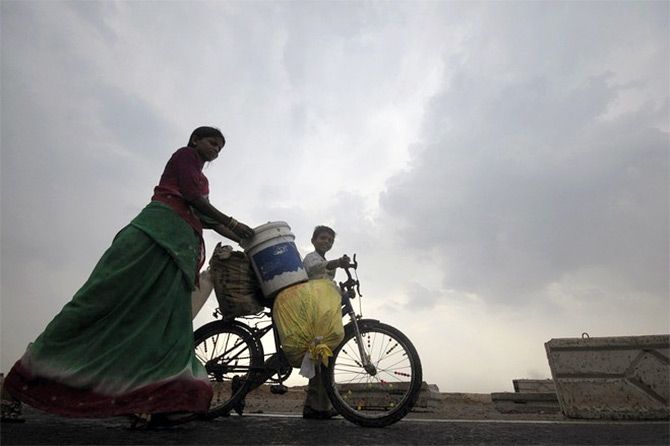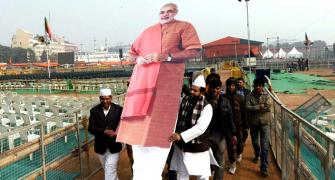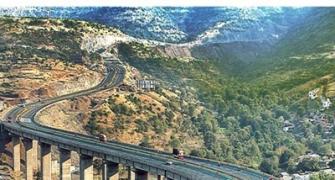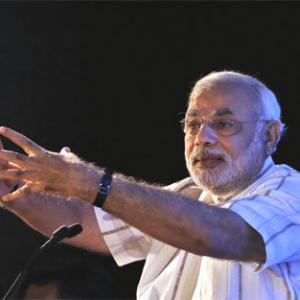Money is being released and the government knows it will have to front-run private investment, notes Akash Prakash.
 I had the privilege of spending four days in India over the past fortnight as part of an investment tour organised by Morgan Stanley.
I had the privilege of spending four days in India over the past fortnight as part of an investment tour organised by Morgan Stanley.
Two days as part of their annual India conference and two as one of the participants of a chief information officer (CIO) tour. We met policymakers, industrialists and independent experts.
I must say I went back from the trip more positive. There was a clear sense of direction and purpose to what the government wanted to achieve.
Yes, things were taking longer than one wished; yes, one wanted more radical reforms - but there was a plan to turn around the economy and it was in the midst of execution.
Some specific points of interest:
There is a sense that in sectors like rail, roads, coal, power transmission and renewables investment has begun to pick up, led by the government.
Money is being released and the government knows it will have to front-run private investment.
The railways look likely to be a big driver of public investment - a sensible minister, access to long-term funds and a slew of bankable projects.
Expect to see quick movement here, not just in the dedicated freight corridors but in line doubling, rolling stock, new lines for last mile connectivity, etc.
Roads are getting on track. Officials feel confident that more than 10,000 km would be ordered and over 6,000 km built in 2015-16 (compared with 4,000 km in 2014-15).
Of the 80 road projects stuck when the National Democratic Alliance (NDA) took over, only 20 remain, with 16 projects being taken over by the National Highways Authority of India (NHAI) and many being cancelled and re-tendered.
Having moved to more engineering, procurement and construction (EPC)-based project awards and stricter norms for project readiness before being put to bid, orders in this regime will translate far more quickly into actual construction.
There remains an intense focus on improving the ease of doing business.
We heard discussions on how many approvals had moved online, how states had started competing to make things easier for companies and on further simplifications being planned.
There has already been more movement on labour laws in the last 12 months than in the previous 20 years. There seemed to be a genuine game plan to improve India's poor rankings on these metrics.
The power panel highlighted solar and transmission as two areas of real excitement. There seems to be a large pipeline of projects in both areas, with investor interest and the policy framework in place.
Within nine months, the southern grid will be connected to the national grid, releasing 4,000 Mw of stranded power from surplus areas and allowing true decentralisation of generation.
Distribution remains the Achilles heel of the sector, with no solution in sight. The panelists were not willing to hazard a guess on when this holy cow will be tackled.
In a fascinating presentation, one learnt of the huge opportunity in lending to the informal sector.
The presentation made the point that even in urban India, most small enterprises and the poor had no access to formal credit due to lack of documentation.
The new Reserve Bank of India (RBI) guidelines for small banks had opened up the field for professionally run microfinance.
One can expect to see interesting new business models develop here, giving investors an opportunity to participate.
Poor corporate profitability: The leverage in the system, a sharp decline in inflation, rupee strength and steep cuts in government spending have all combined to decimate corporate balance sheets.
With both inflation stabilising and the government in far better control of the fisc, these pressures should begin to ease.
There may be some fiscal buffers in the Budget; this could be a positive surprise and all departments are being encouraged to spend.
Corporate profits are at decade lows, regression to the mean is inevitable.
Public sector banks: This was every investor's favourite bear argument for India. The approach seemed to be that it was pointless to simply recapitalising the banks in their current form. We need to first fix the governance problem in public sector banks and then give them capital, so that the current non-performing assets (NPA) mess is not repeated.
Efforts are underway to bring in high-quality chairmen, with some of the names doing the rounds being quite impressive. Next will be new chief executives.
It will take time to get in the type of candidates needed. Attempts to fix the boards are also underway.
There was also a view that many of the public sector banks could unlock value and capital through real estate, by monetising non-core assets and by simply sweating their balance sheets better.
Capital will ultimately be provided to these banks, the government understands that there is no alternative - but they have 18-24 months and want to push on improving the governance of these institutions in the time they have.
My own sense is that non-voting shares and consolidation will be part of the answer.
The free lunch for corporate India is coming to an end. The days of promoters keeping all the upside and the banks the downside are over.
The RBI and the government are seemingly united on this, with the new strategic restructuring guidelines an important tool in the hands of banks to go after difficult borrowers. Expect a renewed thrust on asset sales by leveraged companies.
Many companies have been caught off guard by the lack of bailouts and are complaining loudly.
It is taking time for them to adjust to the new rules of business and the end of crony capitalism. This change will drastically improve the productivity of capital in the long term.
There was tremendous excitement around start-ups and new business models. Almost 40 per cent of Indian Institute of Technology and Indian Institute of Management grads are now either joining a start-up or starting one themselves.
The funding ecosystem has seemingly also now come into place.
The incumbents in India, across sectors, seem determined to drive the digital transformation; they do not want to be disintermediated like in the West.
Real estate has seemingly never seen a worse slowdown in both prices and the velocity of transactions.
This has created stress on all inputs to this sector, be it cement, steel or labour. With the crackdown on black money here to stay, the pressure here will only intensify.
Top level corruption has reduced drastically, not so at lower levels, but it is an improvement and the beginning of a journey.
Obviously there are short-term challenges to markets and the economy. Rural India and consumption more broadly are in stress, earnings will still take time to improve.
The government continues to lack depth and talent beyond a handful of strong individuals.
Corporations still seem to pine for bailouts. The RBI seems more hawkish than needed. Markets are over-owned and not cheap.
The prime minister is also not instinctively a free-market person; he still seems to believe in the power of the government to deliver, rather than in market-based solutions.
Politics make passage of key reforms not a given. The improvements in both policy and economy have been slower than we all had hoped for.
Markets could easily correct in the coming months or days. We seem to be stuck in a trading range, breaking out of which will be difficult. There is no need to chase markets.
However, whenever markets correct, it is, to my mind, a buying opportunity. The long-term direction is clear - economic growth will continue to accelerate, earnings improve, and inflation and rates remain subdued.
Keep an eye on the long term; markets will keep correcting and throwing up opportunities.
The writer is at Amansa Capital. These views are his own.










